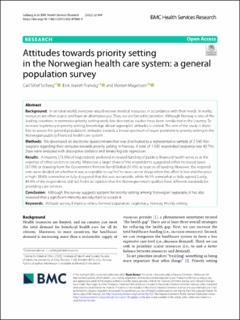| dc.contributor.author | Solberg, Carl Tollef | |
| dc.contributor.author | Tranvåg, Eirik Joakim | |
| dc.contributor.author | Magelssen, Morten | |
| dc.date.accessioned | 2022-10-18T08:49:18Z | |
| dc.date.available | 2022-10-18T08:49:18Z | |
| dc.date.created | 2022-04-05T12:49:25Z | |
| dc.date.issued | 2022 | |
| dc.identifier.citation | BMC Health Services Research. 2022, 22 . | en_US |
| dc.identifier.issn | 1472-6963 | |
| dc.identifier.uri | https://hdl.handle.net/11250/3026564 | |
| dc.description.abstract | Background: In an ideal world, everyone would receive medical resources in accordance with their needs. In reality, resources are often scarce and have an alternative use. Thus, we are forced to prioritize. Although Norway is one of the leading countries in normative priority setting work, few descriptive studies have been conducted in the country. To increase legitimacy in priority setting, knowledge about laypeople’s attitudes is central. The aim of the study is there- fore to assess the general population’s attitudes towards a broad spectrum of issues pertinent to priority setting in the Norwegian publicly financed health care system. Methods: We developed an electronic questionnaire that was distributed to a representative sample of 2 540 Nor- wegians regarding their attitudes towards priority setting in Norway. A total of 1 035 responded (response rate 40.7%). Data were analyzed with descriptive statistics and binary logistic regression. Results: A majority (73.0%) of respondents preferred increased funding of publicly financed health services at the expense of other sectors in society. Moreover, a larger share of the respondents suggested either increased taxes (37.0%) or drawing from the Government Pension Fund Global (31.0%) as sources of funding. However, the respond- ents were divided on whether it was acceptable to say “no” to new cancer drugs when the effect is low and the price is high: 38.6% somewhat or fully disagreed that this was acceptable, while 46.5% somewhat or fully agreed. Lastly, 84.0% of the respondents did not find it acceptable that the Norwegian municipalities have different standards for providing care services. Conclusion: Although the survey suggests support for priority setting among Norwegian laypeople, it has also revealed that a significant minority are reluctant to accept it. Keywords: Attitude survey, Empirical ethics, General population, Legitimacy, Norway, Priority setting | en_US |
| dc.description.abstract | Attitudes towards priority setting in the Norwegian health care system: a general population survey | en_US |
| dc.language.iso | eng | en_US |
| dc.relation.uri | https://bmchealthservres.biomedcentral.com/articles/10.1186/s12913-022-07806-9 | |
| dc.rights | Navngivelse 4.0 Internasjonal | * |
| dc.rights.uri | http://creativecommons.org/licenses/by/4.0/deed.no | * |
| dc.title | Attitudes towards priority setting in the Norwegian health care system: a general population survey | en_US |
| dc.type | Peer reviewed | en_US |
| dc.type | Journal article | en_US |
| dc.description.version | publishedVersion | en_US |
| dc.source.volume | 22 | en_US |
| dc.source.journal | BMC Health Services Research | en_US |
| dc.identifier.doi | 10.1186/s12913-022-07806-9 | |
| dc.identifier.cristin | 2015392 | |
| cristin.ispublished | true | |
| cristin.fulltext | original | |
| cristin.qualitycode | 2 | |

